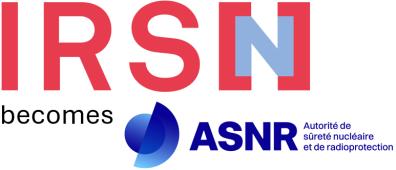IRSN’s Strategic Messages for the Next EURATOM Research and Training programme under FP10
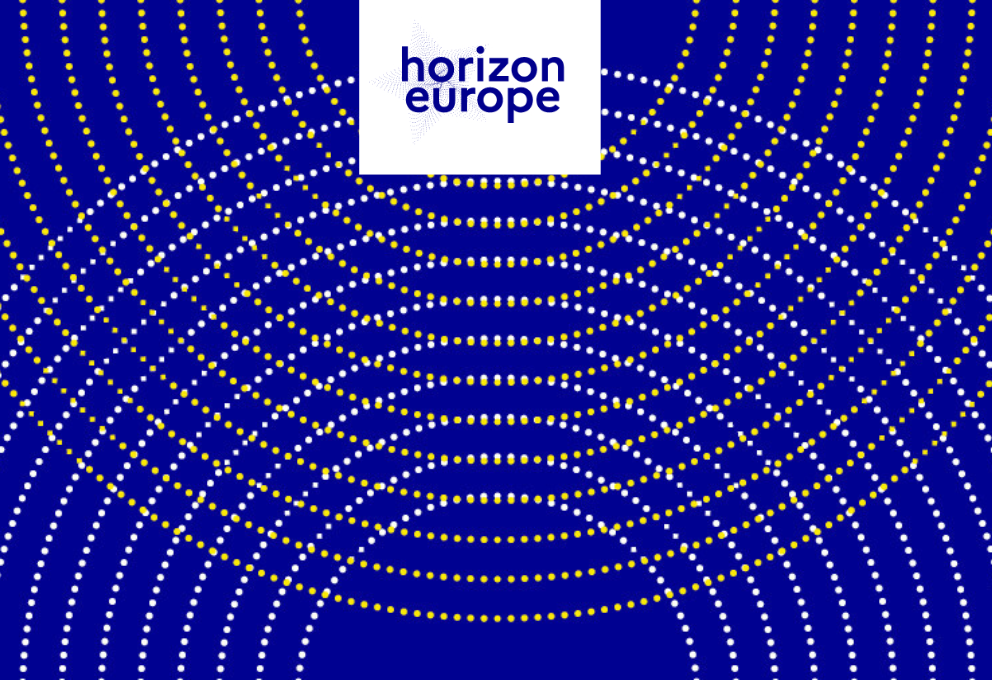
The Institute for Radiation Protection and Nuclear Safety (IRSN) is the public expert in research on and expertise of nuclear and radiation risks. It is actively involved in EU projects. Indeed, it currently participates to 38 projects (out of which 33 under EURATOM calls). As we prepare for the design of the Next EURATOM Research and Training Programme under the Next EU Framework Programme for Research and Innovation (FP10), IRSN has shared its vision and strategic messages with its partners as follows :
Background
The Institute for Radiation Protection and Nuclear Safety (IRSN) is outlining its strategic contribution for the Next Euratom Research and Training Programme under the Tenth Framework Programme for Research and Innovation. IRSN is committed to improving nuclear safety, radioactive waste management, and radiation protection across all fields, including the medical sector, and promoting innovative research in order to address emerging global challenges in a rapidly-evolving societal context. By prioritising scientific excellence in research across all TRLs, promoting collaboration, modernising policies, and strengthening agile regulatory frameworks, IRSN intends to contribute to a safer and more resilient future for Europe in terms of the power and non-power-related applications of nuclear science and technologies. IRSN has therefore identified the following five strategic priorities which are based on its extensive experience in co-funded Euratom projects such as the European Partnership for Radiation Protection Research.
1. Promoting Partnerships as a priority instrument for the sustainable co-funding of all types of research in various fields, including (i) open calls for research proposals (i.e. beyond the consortium partners) and for the development of advanced numerical simulation, data and knowledge management tools, (ii) a comprehensive education and training programme to promote the leadership of the next generation of professionals, and (iii) mobility options for researchers at all stages of their careers to help them improve their skills faster and facilitate access to infrastructures.
2. Building concrete bridges between European clusters and Partnerships (e.g., launch joint co-funded open calls for partnerships between Health or Civil Security for Society clusters and Euratom partnerships); and enhancing the creation of benefits for Member States and citizens as well as for the whole community, i.e. academia, public authorities, industry, operators, implementers/practitioners, and civil society groups.
3. Continuing efforts to optimise the use of European research infrastructures including European computing platforms, by promoting their shared use and simplifying access; Developing a European initiative to study the design of future infrastructures expected to take shape in 10 years’ time to mitigate the risk of losing current infrastructures (e.g., towards a European laboratory for future nuclear applications and practices).
4. Encouraging a shift towards trans-disciplinary approaches, i.e. promoting coordinated activities across disciplines and the involvement of parties other than scientists including a wide range of other stakeholders (e.g., researchers/scientists from various disciplines including Social Sciences and Humanities, local/regional population communities, national/international civil society groups, policy makers, regulators, industry, etc.); promoting open science, ensuring science is accessible to all, and reintegrating science into decision-making processes to improve public understanding.
5. Facilitating third-party access by simplifying legal and financial procedures, encouraging collaboration, innovation, and the involvement of a wider range of external organisations/participants.
First steering committee meeting for the joint lab NUS-SNRSI/IRSN
The first steering committee meeting was held on October 22, 2024 in Singapore, in the presence of IRSN Director General Jean-Christophe Niel. The committee comprises Diane Tiong, Christelle Chua and Garvin Mak for NUS-SNRSI, and Jean-Michel Bonnet, Olivier Marchand, Marc Gleizes and Marilyne Tombette for IRSN. It will be chaired by Marc Gleizes for the first two years.
A Joint Laboratory agreement between the Singapore Nuclear Research and Safety Initiative of the National University of Singapore (NUS-SNRSI) and IRSN was signed on May 2. Under the terms of the agreement, the laboratory will be governed by a steering committee.
The joint laboratory director, Prof. Keng Yeow Chung, director of NUS-SNRSI, and its deputy director Jacqueline Garnier-Laplace, Scientific Coordinator of the European Radiation Protection Strategy of IRSN, presented an overview of activities for 2024, the work program for 2025 and the outlook for 2026 concerning the laboratory's three research themes of radiochemistry, radiobiology and safety of SMRs.
Julie-Anne Zambaux from IRSN also took the opportunity to share feedback from her 6-month secondment to NUS-SNRSI on the development of ASTEC for SMRs. Moreover, the teams regularly exchange on scientific topics of common interest, as demonstrated by IRSN's specialists Azza Habibi and Gaëtan Gruel’s remote presentations.
IRSN members of the steering committee also enjoyed a visit of the NUS-SNRSI facilities at their newly constructed building.
This meeting marks a new stage in the long-term collaboration that IRSN and NUS-SNRSI have experienced and maintained for the past 10 years.
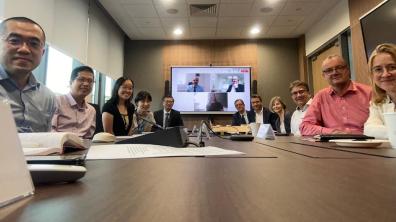
Workshop AEN FRAME: Future Research for Accident Management Enhancement in operating and future reactors, informed by Fukushima Daiichi insights – Argonne, September 26-27, 2024
On September 26-27, 2024, IRSN’s Director General Jean-Christophe Niel participated in Argonne (Illinois - USA) in the NEA’s workshop dedicated to the “Future Research for Accident Management Enhancement in operating and future reactors, informed by Fukushima Daiichi insights”.
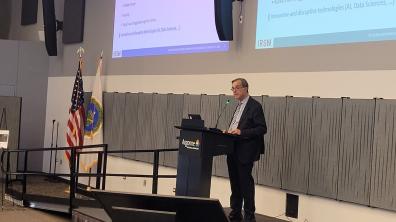
This workshop provided nuclear safety regulators, industry and research organizations with the opportunity to share their views on how the Fukushima-Daiichi accident has been used to inform accident management approaches for operating and future reactors, and on remaining potentials for their enhancement.
It will be also a forum where regulators, industry and research operating agents will share views on potentials for future collaborative research.
Jean-Christophe Niel underlined the large efforts which have been done since the Fukushima-Daichii accident to consolidate severe accident management and mitigation for French NPPs. He mentioned the strong involvement of IRSN in OECD/ NEA’s research projects, which constitute a unique platform for safety research experimentations.
He brought out also the necessity to maintain, replace or evolve existing experimental facilities, and certainly build new ones.
Finally, he mentioned that all new challenges won’t be addressed without involving the international community and all stakeholders, from regulators to operators and designers. Especially maybe the biggest one: in the coming decades, to develop skills and competencies, and train many young professionals to the nuclear field, taking into account innovative and disruptive technologies.”
INWORKS epidemiological study: new results on the risk of leukemia, lymphoma and multiple myeloma among nuclear industry workers
New results from the INWORKS epidemiological study published on August 31, 2024 confirm the existence of a relationship between leukemia risk and cumulative exposure to low doses of ionizing radiation.
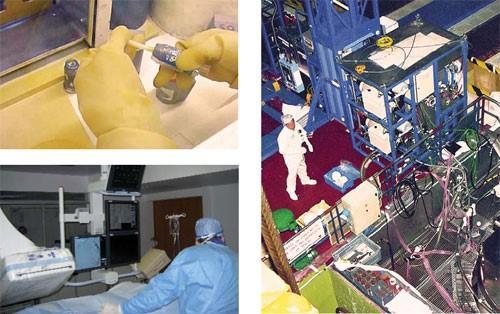
Workers subject to dosimetric monitoring (ou) Dosimetrically monitored workers
INWORKS is an international epidemiological study of mortality among nuclear industry workers. It is a large-scale epidemiological study designed to quantify the health risks potentially associated with repeated exposure to low doses of ionizing radiation. Its aim is to verify the validity of the assumptions underlying the current radiation protection system, which is based in particular on an extrapolation of knowledge of radiation-induced risks drawn from the epidemiological follow-up of survivors of the Hiroshima and Nagasaki bombings. IRSN has been an active contributor to the INWORKS study since its inception.
INWORKS brings together cohorts of French, American, and British workers employed in the nuclear industry (fuel preparation, research, power generation, spent fuel reprocessing) and monitored for external exposure to ionizing radiation by personal dosimeters. The study population includes over 300,000 male and female workers employed from the mid-1940s onwards. The French cohort, led by IRSN, includes over 59,000 workers from CEA, EDF, and Orano.
New research results recently published on the website of the journal “The Lancet Haematology” show that the risk of death from leukemia (excluding chronic lymphocytic leukemia, considered to be non-radiation-induced) increases in proportion to the dose accumulated by the workers over the course of their working careers. They also confirm that risks are low at low doses.
These results reinforce our knowledge of the effect of protracted exposure to low doses of ionizing radiation, and therefore constitute an important addition to the consolidation of the assumptions underlying the radiation protection system. In particular, they support the justification for radiological protection of populations exposed to low doses of ionizing radiation (nuclear industry workers, medical staff, diagnostic medical exposure, etc.).
Read the IRSN information note on the new INWORKS results (PDF)
Read the publication in The Lancet Haematology
Previous information notes
- October 3, 2023: Publication of new results from the INWORKS epidemiological study on cancer risk in nuclear industry workers (PDF)
- October 21, 2015: Publication of new results from the INWORKS epidemiological study on cancer risk in nuclear industry workers chronically exposed to low doses of ionizing radiation (PDF)
- June 23, 2015: Publication of the first results of the INWORKS epidemiological study on the risk of leukemia and lymphoma in nuclear industry workers chronically exposed to low doses of ionizing radiation (PDF)
